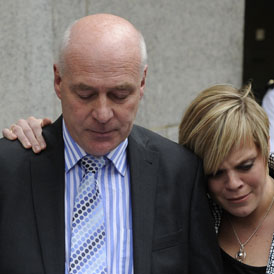Families ‘traumatised’ by court system
The first survey of its kind by the Victims’ Commissioner shows that the criminal justice system adds to the trauma of bereavement for victims’ families.

The Victims’ Commissioner is calling for a new law to ensure families are protected in the criminal justice system, after research showed that trials add to the trauma of losing a loved one.
Louise Casey’s report to Justice Secretary Ken Clarke comes after the family of Milly Dowler said they had been traumatised by the experience of giving evidence in the trial of the schoolgirl’s killer, Levi Bellfield.
Ms Casey’s office carried out what is thought to be the first large-scale survey of more than 400 families of homicide victims.
She said some of the stories were “jaw-droppingly awful” and added: “The system must be levelled up so victims and bereaved families are no longer seen as bystanders or an inconvenience as the wheels of justice turn.”
The Victims’ Commissioner wants the law changed so that victims’ bodies are released back to their family within 28 days, unless there are exceptional circumstances.
At the moment, the commissioner’s research suggests that 78 per cent of families have to wait for more than a month before they can hold a funeral.
‘Our system needs to be looked at’
She is also recommending that families should have a right to transcripts of the trial or the judge’s sentencing remarks, instead of being asked to pay thousands of pounds for copies.
Other proposals are: for a new Criminal Procedure Practice Direction about the needs and treatment of bereaved families in court; for a new police protocol on reviewing unsolved cases; for the right for families to meet with prosecution lawyers at key stages; and for an integrated package of help and support following the death.
Research suggests that families who have no involvement in the criminal justice process actually cope better. Louise Casey, Victims’ Commissioner
Ms Casey said the research suggests that the criminal justice system “in many cases actually adds to the pain of traumatic bereavement”.
She added: “It is shocking that research outlined in this report suggests that families who have no involvement in the criminal justice process actually cope better.”
The victims’ commissioner said: “If the message that comes out of the Dowler family’s case is that it’s such a horrific experience, don’t do it, then actually our system needs to be looked at.”
CPS ‘not supportive’
But it was not only defence lawyers that were crticised by families.
More than half the respondents (55 per cent) found the Crown Prosecution Service “not to be supportive of the family and there were serious concerns about them in some cases”, the report said.
“The ‘aloof’ attitude of the prosecution barristers has been frequently raised,” it added.
“While families viewed contact with the prosecution as of significant importance due to it being about the trial of the person who killed their loved one, they were often disappointed to find the barristers barely acknowledging them.”
This is about making the adversarial experience more bearable for families dealing with grief and trauma. Keir Starmer, DPP
The Director of Public Prosecutions, Keir Starmer QC, said the CPS will double the number of occasions when it offers victims a face-to-face meeting with lawyers.
He added: “I am committing the CPS to contributing to the Ministry of Justice review of the treatment of victims and I am also committing the CPS to ongoing positive dialogue with Louise Casey. I am determined that we will play our part.
“This is not about changing the legal system, but about making the adversarial experience more bearable for families dealing with grief and trauma.”
Ms Casey said: “I think it is right that the defence has the ability to put its case in a way which the judge thinks is appropriate and I am not in any way arguing that this is about taking rights away from defendants. That would be wholly wrong.”
Justice Secretary Ken Clarke said the government had increased funding for specialised homicide support workers by £500,000.